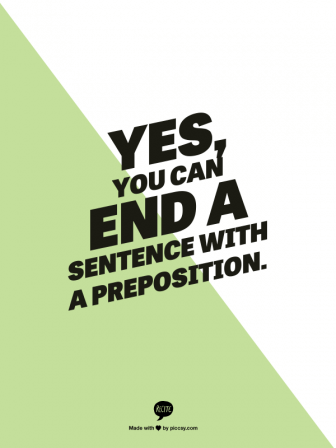Funny Whencant Stop Thinking How Good Ur Girl Looked
We are currently experiencing playback issues on Safari. If you would like to listen to the audio, please use Google Chrome or Firefox.
Hide player
The Quick And Dirty
Although many people were taught to avoid ending a sentence with a preposition, nearly all modern style guides say it's not a rule, and if your sentence sounds more natural with a preposition at the end, it's fine to leave it that way.
One of the most frequent questions I'm asked is whether it's acceptable to end a sentence with a preposition.
I know many of you were taught that you shouldn't end a sentence with a preposition, but that's a myth. In fact, I consider it one of the top ten grammar myths because so many people believe it's true, but nearly all grammarians disagree, at least in some cases (1, 2, 3, 4, 5, 6, 7, 8).
So before I lose you, let's back up. What is a preposition?
What Is a Preposition?
A preposition is a word that creates a relationship between other words. It's been said that prepositions often deal with space and time (1), which always makes me think of "Star Trek."
For example, the prepositions "above," "by," and "over" all say something about a position in space:
- The picture is above the fireplace."
- The nightstand is by the bed.
And the prepositions "before," "after," and "since" all say something about time:
- We went for a walk before dinner.
- We had dessert after dinner.
Buy Now

As an Amazon Associate and a Bookshop.org Affiliate, QDT earns from qualifying purchases.
When Can a Sentence End with a Preposition?
So what about ending a sentence with a preposition?
Here's an example of a sentence that can end with a preposition:
- What did you step on?
An important point is that the sentence doesn't work if you leave off the preposition. You can't say, "What did you step?" You need to say, "What did you step on?" to make a grammatical sentence.
I can hear some of you gnashing your teeth right now while you think, "What about saying, 'On what did you step?'" But really, have you ever heard anyone talk that way? I've read long, contorted arguments from noted grammarians about why it's OK to end sentences with prepositions when the preposition isn't extraneous (1), but the driving point still seems to be, "Nobody actually talks this way." Yes, you could say, "On what did you step?" but not even grammarians think you should. It usually sounds pedantic.
When Can't You End a Sentence with a Preposition?
But, you can't always end sentences with prepositions. As I said last week, I recommend that when you could leave off the preposition and it wouldn't change the meaning, it's best to leave it off.
People do use unnecessary prepositions at the end of sentences when they talk, as in the question "Where are you at?" that we talked about last week. And as I said, there's even a reason because English used to have three different words for "where"—"where," "whither," and "whence"—and because of "whither" and "whence," you could almost predict that people would end up saying "where at."
But, and this is a big "but," the "at" at the end of "Where are you at?" jumps out at a lot of people who care about language because the "at" is unnecessary. If you ask "Where are you?," it means the same thing, and the general feeling is that because the "at" is unnecessary, you should leave it off.
Unnecessary Prepositions
The problem with unnecessary prepositions doesn't happen just at the end of sentences either. People often throw unneeded prepositions into the middle of sentences, and some people think that's bad too (2). Instead of saying "Squiggly jumped off of the dock," it's better to say "Squiggly jumped off the dock." You see? You don't need to say "off of the dock"; "off the dock" says the same thing without the extra preposition.
Another example is "outside of" when "outside" by itself would do just fine. You can say, "He's outside the door," not, "He's outside of the door."
Sentences Can End with Prepositions from Phrasal Verbs
So far, my examples of prepositions at the end of sentences have all been questions. Lest you think they're a special case, we'll look at some sentences that aren't questions.
English has a type of verb called a phrasal verb. These are verbs made up of multiple words, and one is usually a preposition. "Cheer up," "run over," "log on," and "leave off" are all examples of phrasal verbs, and often sentences that use phrasal verbs end with a preposition:
- I wish he would cheer up.
- You should leave it off.
Those are perfectly acceptable sentences, and some people argue that the words at the end aren't even prepositions. They're adverbs that modify the verb.
Other Sentences Can End with Prepositions Too
I don't religiously avoid ending sentences with prepositions anymore. If a sentence sounds awkward when I rewrite it the "right" way, I leave it with a preposition at the end. For example, I wouldn't rewrite this sentence.
- She displayed the good humor she's known for. (That could be rewritten as "She displayed the good humor for which she's known," but that sounds too stuffy to me.)
And here's one more:
- I want to know where he came from. (That could be rewritten as "I want to know from where he came," but I wouldn't do it.)
Cover Letter Grammar
I said you don't need to rewrite those sentences, and I don't, but because the myth that it's wrong to end sentences with prepositions is so prevalent, there are times when you should avoid doing it even though I'm saying it isn't wrong.
For example, when you're writing a cover letter to a potential employer, don't end a sentence with a preposition. The person reading the letter could see it as an error. I always recommend following the most conservative grammar rules in job applications. I'd rather be hired than lose an opportunity because my grammar was perceived as wrong.
But once you're hired, and you're in a position to have a discussion about grammar, don't be afraid to do your part to dispel one of the top ten grammar myths, and end sentences with prepositions when it sounds best as long as the preposition isn't unnecessary and as long as it won't hurt your credibility with readers.
Only you (or your boss) can determine whether your audience is likely to notice or care. And if you need back-up, you can show your boss almost any good style guide. They all say there's no hard-and-fast rule about not ending a sentence with a preposition.

References
- Huddleston, R. and Pullman, G.K. A Student's Introduction to English Grammar. Cambridge: Cambridge University Press, 2006, p. 20, 137-8.
- Strumpf, M. and Douglas, A. The Grammar Bible. New York: Henry Holt and Company, 2004, p. 231, 217.
- Thurman, S. The Only Grammar Book You'll Ever Need. Avon: Adams Media, 2003, p.32.
- Stilman, A. Grammatically Correct. Cincinnati: Writer's Digest Books, 2004, p.264.
- O'Connor, P. "The Living Dead: Let Bygone Rules Be Gone" Grammarphobia.com, http://www.grammarphobia.com/grammar.html (accessed December 2, 2020).
- Lutz, G. and Stevenson, D. Grammar Desk Reference. Cincinnati: Writer's Digest Books, 2005, p. 41.
- Garner, B. Garner's Modern American Usage. Oxford University Press, 2009, p. 654.
- Wilson, K. G. The Columbia Guide to Standard American English. New York: Columbia University Press, 1993, p. 341.
Source: https://www.quickanddirtytips.com/education/grammar/ending-a-sentence-with-a-preposition
0 Response to "Funny Whencant Stop Thinking How Good Ur Girl Looked"
Post a Comment